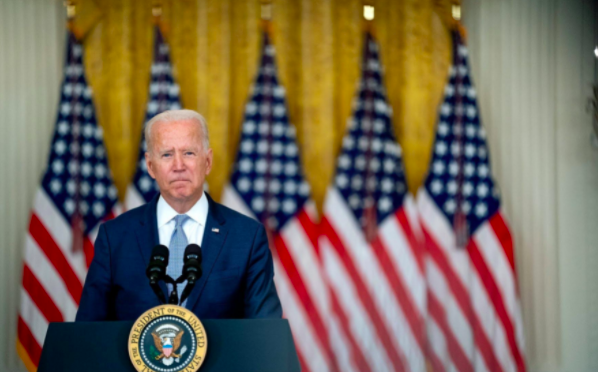BIDEN’S ‘AMERICA FIRST’ AND THE AFGHAN CREDIBILITY CRISIS
Posted on : August 28, 2021Author : Raunak Bhattacharya

In 2001, when Operation Enduring Freedom was launched under the Bush Presidency, Afghanistan breathed unto itself, a new life. The Soviet invasion of the 1980s was intended to strengthen the People’s Democratic Party (PDP) administration. But, as Khaled Hosseini has aptly stated in his work, The Kite Runner, the Afghan people have got a penchant for autonomy, that becomes almost antithetical to the institutionalized order. Order, it seems, is an alien aspect, to Afghanistan. The heterogeneity of tribes, and the existence of a plethora of fiefdoms, make institutionalized order, an impediment to the free-willed nature of the Afghan populace. This brings us to the question of our contemporary times, and involves introspection of what we envision as ‘truth’.
The reader need not be reminded of the wider roles that have been played by the United States in the latter half of the 21st century, to augment and push forward a discourse of Afghan self-determination, and in its wake, commence with the funding of the Mujahideen fighters. The massive influx of fighters from the Middle East soon made discernible, the associated ramifications. The Taliban emerged as heroes, saving the populace from the autarchical actions, and the organized anarchy and violence of the Mujahideen, and it was the coup de grâce to the very autonomy that the Afghan people have had craved for. Derived from the Arab word, Talib, meaning ‘student’, etymologically, at least, the Taliban identified itself as a student movement, with strict adherence to Sharia law, and its Hanafi interpretation, but in retrospect, most of the foot-soldiers and the hierarchy of the organization lacked requisite literacy, and were mostly illiterate. The Taliban incursion, in its tread, led to the creation of an Afghanistan that served as a hotbed of terrorist activities, a safe haven that began to haunt the very United States, which had funneled the funds and sponsored the ‘Soldiers of God’ against the Soviet invasion.
Following 9/11, the War Against Terror intensified, and so began a host of operations against the newly christened Islamic Emirates of Afghanistan, that was hosting the Al Qaida supremo, Osama Bin Laden at that very point of time. The aforementioned commencement of Operation Enduring Freedom witnessed a US-led NATO invasion of Afghanistan, and the subsequent formation of the Islamic Republic of Afghanistan. The process of normalcy and democratization began, however, the war against the Taliban was far from over. The Taliban continued to hold their sway over large parts of the Nation. Despite the loosening of their sway and influence, the Taliban did not just abruptly vanish from the stage, and continued to be a menacing agent to the actors in the region.
Enduring Freedom ended in 2014, and consequently, began Operation Freedom Sentinel in the same year. It was under President Barack Obama that the changes to the operational structure were taking place. Vice President Joseph Biden, in those days, pushed for a new counterterrorism policy directive. Having served in the Vietnam War, he did have some understanding pertaining to the morphology of guerilla warfare.
Following the structure provided by Alexander L. George in his work, ‘The Causal Nexus between Cognitive Beliefs and Decision-making Behavior’, this author shall attempt to formulate a Role Conception (shaping of beliefs and images) and to find out a set of congruent behavior, consistent but unlikely behavior and incongruent behavior, thereby leading to a proper understanding of Biden’s Afghanistan Policy using two variables: Explanatory and Dependent.
Biden’s present geopolitical and geostrategic interests are directed by rising China, a phenomenon that can be very aptly described as the Thucydides’ Trap, following Graham Allison’s path breaking work. In a television interview in March 2020, President Biden described the U.S.-Taliban agreement as “not a very solidly negotiated deal.” Yet, it was the Biden Administration that went ahead and in fact, implemented the deal.
Afghanistan has been relentlessly assessed as a relatively weak state, as opposed to an absolutely weak state, and that has happened to make all the difference. However, it is pertinent and requisite, at this moment, to cast a glance at the US-Taliban Agreement formalized by the Doha Dialogue in February 2020. The terms of the Agreement as endorsed by the Trump Administration, surprisingly did not include the Karzai Administration. In fact, the very mention of the Islamic Emirates of Afghanistan in the document, strengthened the position of the Taliban. The question of harmony of interests and stability in the Afghan region happened to be a sideline affair. In fact, the Agreement was labelled by President Biden as “not a very solidly negotiated deal”.
It could be expected that the Biden Administration would take a different policy perspective, one much more cohesive, extensive in scope and adhering to the preservation of the Islamic Republic of Afghanistan, whilst securing American harmony of interests. It must also be noted from the recommendations made by the Afghanistan Study Group regarding the creation of a ‘regional strategy’ or to put it in other words, to play a dominant role in the formation of a regional forum like the Quadrilateral Security Dialogue to ensure security. The ASG had also proposed the participation of the said allies in the negotiations and the involvement of the United Nations Security Council (UNSC) in the said proceedings. It seems none of these recommendations have been adhered to.
The Afghan withdrawal is reflective of a larger institutional challenge posed to the US civil-military relations. The American system of checks and balances comes into play, albeit in a dysregulated manner, hampering the institutional ethos of the United States Armed Forces. The hasty withdrawal of the US forces, was followed in tandem by a very concomitant and planned Taliban attack upon Afghan pilots, thereby, making the air power capabilities of the ANDSF (Afghan National Defense and Security Forces) obsolete. The fact that the Taliban could envisage the reality of the US withdrawal, and take over the country in a swoop, was not at all perplexing. As a matter of fact, Afghanistan has been in a state of war for the last 20 years (from 2001-2021), and the American assurance of nation-building, does seem to be a significant hoax, delivered in poor taste, with the telos primarily being the geopolitical instrumentalization of the territory to augment the scope of counterterrorism.
The American withdrawal seals the fate of Afghan democracy, pushing it back to the conditions of a civil war. The Panjshir Valley resistance, with Ahmad Masoud and Amrullah Saleh at the helm, indicates the spirit of the Afghan people, to counter the Taliban influence. Amrullah Saleh, the Vice President of the Islamic Republic of Afghanistan, has appointed himself as the Acting President, following the unceremonious escape of erstwhile President Ashraf Ghani, saving himself from the fate meted out to Mohammad Najibullah. Biden’s stance reflecting the American position is a sure sign of American Populism, and how the same has begun to dictate Foreign Policy decisions, putting American raison d’état at a very threatening juncture as the Thucydides’ Trap is closing in.
Raunak Bhattacharjee
Intern, AGA





Leave a Reply